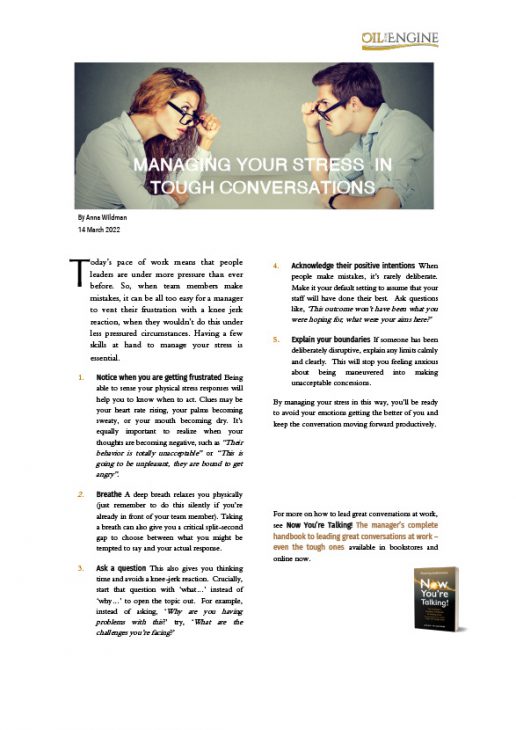Today’s pace of work means that people leaders are under more pressure than ever before. So, when team members make mistakes, it can be all too easy for a manager to vent their frustration with a knee jerk reaction, when they wouldn’t do this under less pressured circumstances. Having a few skills at hand to manage your stress is essential.
Five ways to instantly manage your stress
- Notice when you are getting frustrated. Being able to sense your physical stress responses will help you to know when to act. Clues may be your heart rate rising, your palms becoming sweaty, or your mouth becoming dry. It’s equally important to realize when your thoughts are becoming negative, such as “Their behavior is totally unacceptable” or “This is going to be unpleasant, they are bound to get angry”.
- Breathe. A deep breath relaxes you physically (just remember to do this silently if you’re already in front of your team member). Taking a breath can also give you a critical split-second gap to choose between what you might be tempted to say and your actual response.
- Ask a question. This also gives you thinking time and avoids a knee-jerk reaction. Crucially, start that question with ‘what…’ instead of ‘why…’ to open the topic out. For example, instead of asking, ‘Why are you having problems with this?’ try, ‘What are the challenges you’re facing?’
- Acknowledge their positive intentions. When people make mistakes, it’s rarely deliberate. Make it your default setting to assume that your staff will have done their best. Ask questions like, ‘This outcome won’t have been what you were hoping for, what were your aims here?’
- Explain your boundaries. If someone has been deliberately disruptive, explain any limits calmly and clearly. This will stop you feeling anxious about being maneuvered into making unacceptable concessions.
By managing your stress in this way, you’ll be ready to avoid your emotions getting the better of you and keep the conversation moving forward productively.




